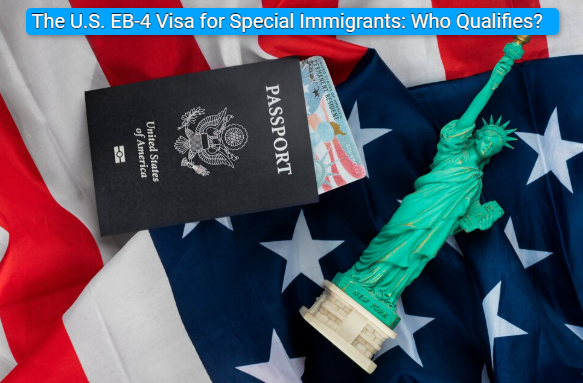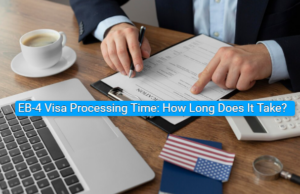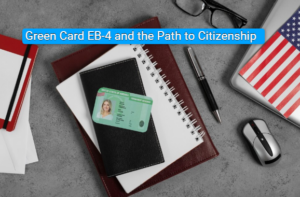The U.S. EB-4 Visa for Special Immigrants: Who Qualifies?

The U.S. EB-4 Visa: Who Is Eligible for Special Immigrant Status?
The EB-4 visa provides a critical avenue of entry to the United States for some individuals. This visa is distinct from better-known work visas such as the EB-1 visa or EB-2 visa. Rather, it serves individuals who fall within special categories. These categories include individuals who perform religious work, employees of international organizations, and certain foreign-born physicians. To apply for this visa, you must understand the EB-4 visa requirements and how to complete your application.
Here, we’ll closely examine the EB-4 visa. We’ll discuss who is eligible to apply, how to apply, and things to remember such as the EB-4 visa processing time, EB-4 priority date, and common issues such as EB-4 religious worker retrogression. We’ll also describe how the EB-4 green card works and how special immigrants can utilize it to become U.S. citizens.
What is the EB-4 Visa Category?

The EB-4 visa category is meant for individuals belonging to special classes of U.S. immigration. The EB-4 visa differs from other employment-based visas in that it affects special immigrant groups, such as:
- Religious Workers
- Employees of International Organizations
- Afghan and Iraqi Translators and Interpreters
- Certain Foreign Medical Graduates
- Retired Employees of International Organizations
Both groups have separate eligibility criteria, and all can obtain permanent United States residency provided they meet requirements. An EB-4 visa can lead to a green card, enabling the holder to reside and work in the country and subsequently take up citizenship after applying.
Requirements for EB-4 Visa: Who Can Apply
To qualify for EB-4 visas, you must be classified in one of the special immigrant classes. Below are the requirements for each class:
Religious Workers
- Eligibility: In order to qualify for the EB-4 religious worker classification, the applicants must be members of a recognized religious denomination for two years or more before applying. They must also seek employment in a religious capacity, like a minister or priest. This category is susceptible to problems like EB-4 religious worker retrogression, where visa demand surpasses supply, resulting in delays.
Employees of International Organizations
- Qualification: Individuals who have worked for a particular international organization (such as the UN or World Bank) for a period of one year or more may be eligible to apply for the EB-4 visa. Such individuals must demonstrate that their work is integral to the operation of the organization.
Afghan and Iraqi Translators and Interpreters
- Eligibility: Translators and interpreters who worked directly with the U.S. government in Iraq or Afghanistan can receive the EB-4 visa if they fulfill certain requirements. This includes establishing that they worked for the U.S. government in war zones.
Foreign Medical Graduates
- Eligibility: Certain foreign medical specialists who work in underserved areas of the U.S. can receive an EB-4 visa if they fulfill certain medical licensing and employment qualifications.
Retired Employees of International Organizations
- Qualification: Employees who worked at international organizations and retired under circumstances that qualify them for an EB-4 visa can apply as special immigrants.
EB-4 Visa Processing Time: How Long Is the Wait?

The EB-4 visa processing time varies depending on a few factors, such as where the individual is from and what immigrant group they belong to. The EB-4 visa processing time can range from several months to two years.
EB-4 Priority Date: The EB-4 priority date is very important as it affects the waiting time for the applicants before they can advance with their application. The priority date is when USCIS receives your petition. Once your priority date is current, you can proceed with the subsequent steps in your application process.
Priority Date Retrogression: Occasionally, with high demand in some visa categories or countries, applicants may experience delays. This is referred to as retrogression, where the priority date moves backward, delaying the applicant’s progression in the process.
The EB-4 Green Card: What You Should Know
Once they are approved for the EB-4 visa, individuals can move to acquire a green card EB-4. The EB-4 green card enables a person to stay in the U.S. permanently, allowing them to reside and work there as long as they please. This classification also permits them to travel, receive some government assistance, and apply to become an American citizen once they have spent the necessary amount of time living there.
Religious Visa Green Card: For individuals working religious occupations, the religious visa green card functions quite similarly. But, as we mentioned earlier, they may be delayed longer due to the EB-4 religious worker retrogression, depending on their country of origin.
Green Card EB-4 and the Path to Citizenship

Once an individual receives a green card EB-4, they are allowed to remain in the U.S. as a legal permanent resident. Five years after receiving a green card, they can apply to become a U.S. citizen by naturalization, satisfying all the requirements (such as residing in the U.S. for a specified period and passing the test of citizenship).
This makes the EB-4 green card an important means for individuals wanting to become U.S. citizens, such as those who work in religion, translation, or for foreign companies.
How to Apply for the EB-4 Visa
Applying for the EB-4 visa is a multi-step process. Here’s what applicants can anticipate:
Filing the I-360 Petition: The application process begins with the submission of Form I-360 Petition for Amerasian Widow(er), or Special Immigrant. This is the form that initiates the process of applying for the EB-4 visa.
USCIS Approval: Once the Form I-360 is submitted, the applicants await approval of the petition by USCIS. USCIS forwards the approved case to the National Visa Center (NVC) for further processing.
Consular Processing or Adjustment of Status: Applicants who are not in the U.S. will have to undergo consular processing at a U.S. consulate or embassy. Those who are already in the U.S. can apply to adjust their status without having to leave the country.
Visa Interview: The majority of applicants will have to visit for an interview with a U.S. consular officer. In this interview, they will have to demonstrate that they fulfill all the requirements for the EB-4 visa.
To Conclude

The EB-4 visa has an important bearing on the journey towards U.S. permanent residency for special immigrants. Understanding the requirements for an EB-4 visa helps individuals move forward with the application process and obtain an EB-4 green card. Although problems such as EB-4 religious worker retrogression or long EB-4 visa processing times can create complications, the EB-4 visa presents is a great opportunity for religious workers, international employees, and other special immigrant groups. If you qualify for an EB-4 visa, you should initiate the application process, gather required documents, and stay current on changes to EB-4 green card processing time and other elements that may impact your path to U.S. residency.
Start Your U.S. Immigration Journey with Confidence
Ready to secure your future in the United States? Visit Passage Law today to get expert guidance on your EB-4 visa application and other immigration needs. Let our experienced attorneys help you navigate the complexities of U.S. immigration law with ease and confidence. Consult now.
DISCLAIMER: This article offers general legal information, not legal advice. Do not rely upon this information without seeking legal counsel. If you need legal advice, you may contact us directly to speak with an attorney. We disclaim all liability concerning actions taken based on any information presented. Every case is different, and outcomes will vary depending on the unique facts and legal issues of your case.
